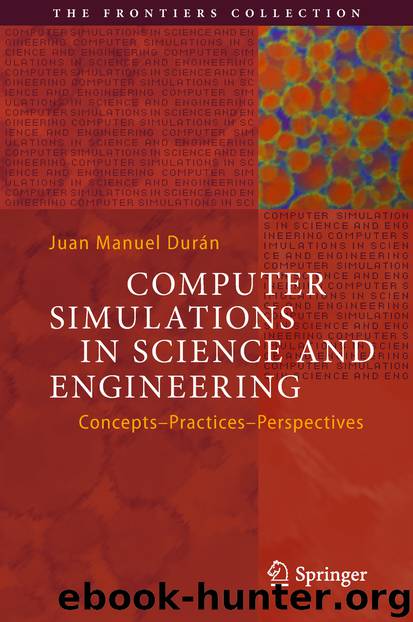Computer Simulations in Science and Engineering by Juan Manuel Durán

Author:Juan Manuel Durán
Language: eng
Format: epub
ISBN: 9783319908823
Publisher: Springer International Publishing
4.3.2 Epistemic Opacity
The previous discussion was an effort to show how errors can contribute to the general inaccuracy of results and thus compromise the reliability of computer simulations. As presented, there are as many sources of errors as there are ways of dealing with them. All things considered, we can justifiably say that many errors—but not all, naturally—are corrigible to a given extent, and therefore they are not so critical to the reliability of computer simulations. Unfortunately, in computational science—and therefore in computer simulations—there is a far more worrying source of mistrust than errors, that is, epistemic opacity.
The history of this concept goes back well before the use of computers for scientific purposes. However, it was Paul Humphreys who introduced the term as a distinctive mark of computer science (Humphreys 2004). According to him, an essential feature of epistemic opacity is that researchers are unable, as cognitively limited human beings, to know all the relevant states of a given computational process at any given time. The argument is quite compelling. It says that no human—or group of humans—could possibly examine every element of the computational process relevant for the assessment and justification of the results. Again, ‘justification of the results’ here simply means to have reasons to believe that the results are correct. Epistemic opacity, then, is conceived as the unrecoverable loss of knowledge about a given computational process followed by the inability to justify the results of such a process (Humphreys 2004, 148). To characterize epistemic opacity more formally, I reproduce Humphrey’s definition:a process is essentially epistemically opaque to [a cognitive agent] X if and only if it is impossible, given the nature of X, for X to know all of the epistemically relevant elements of the process. (Humphreys 2009, 618)
Download
This site does not store any files on its server. We only index and link to content provided by other sites. Please contact the content providers to delete copyright contents if any and email us, we'll remove relevant links or contents immediately.
Enlightenment Now: The Case for Reason, Science, Humanism, and Progress by Steven Pinker(7308)
A Journey Through Charms and Defence Against the Dark Arts (Harry Potter: A Journey Through…) by Pottermore Publishing(4811)
The Immortal Life of Henrietta Lacks by Rebecca Skloot(4581)
A Journey Through Divination and Astronomy by Publishing Pottermore(4384)
Elon Musk by Ashlee Vance(4122)
Origin Story: A Big History of Everything by David Christian(3690)
COSMOS by Carl Sagan(3619)
Alchemy and Alchemists by C. J. S. Thompson(3516)
Bad Pharma by Ben Goldacre(3423)
Enlightenment Now by Steven Pinker(3367)
Shadow of Night by Deborah Harkness(3361)
Inferior by Angela Saini(3311)
A Mind For Numbers: How to Excel at Math and Science (Even If You Flunked Algebra) by Barbara Oakley(3302)
Origin Story by David Christian(3196)
The Code Book by Simon Singh(3185)
Signature in the Cell: DNA and the Evidence for Intelligent Design by Stephen C. Meyer(3132)
The Elements by Theodore Gray(3054)
A Brief History of Time by Stephen Hawking(3023)
A Journey Through Potions and Herbology (A Journey Through…) by Pottermore Publishing(2852)
